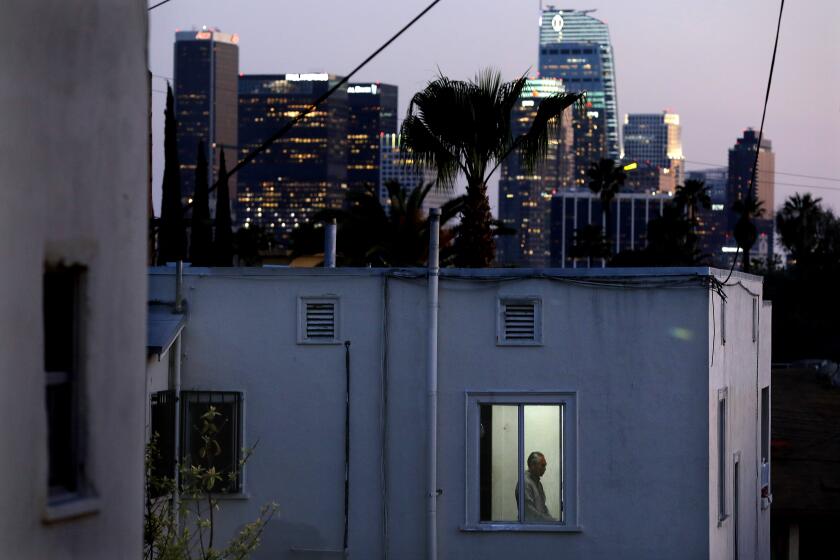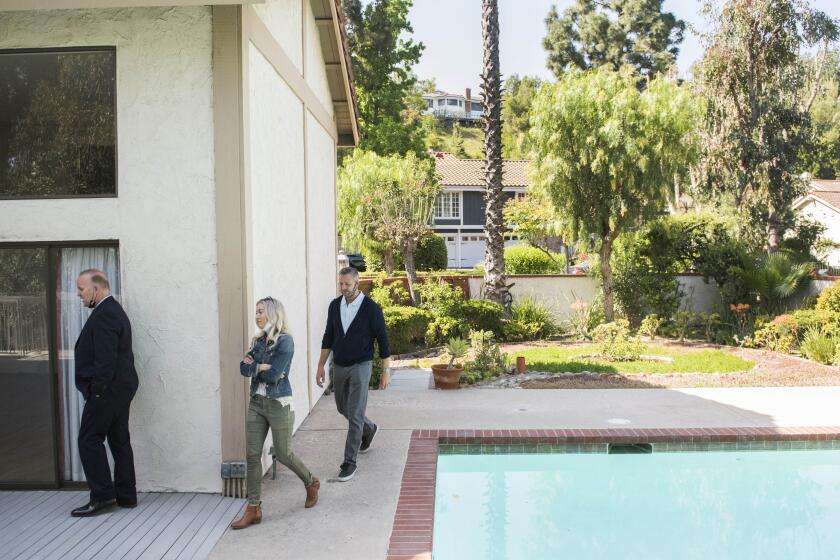In L.A., 13,000 complaints of tenant harassment led to four fines. Advocates call for stronger laws

- Share via
In the three years since Los Angeles banned landlords from harassing tenants and made violating the rules a criminal offense, more than 13,000 complaints alleging harassment have been filed with the housing department. About two dozen of those cases were referred by the department to the city attorney’s office. So far, four fines are pending and no cases have been criminally prosecuted.
When it was approved in 2021, Los Angeles’ Tenant Anti-Harassment Ordinance was touted as a breakthrough for renters’ rights. At a time of rapidly rising housing costs, the rules were meant to protect tenants from being threatened or intimidated by landlords — a tactic advocates say is sometimes used to push people out of rent-controlled homes.
But tenant advocates say harassment has continued largely unchecked in the three years since the law passed, with tenants regularly reporting that their landlords resort to intimidation, illegal eviction notices, threats, lockouts and other actions meant to make their living situations difficult to bear. The thousands of complaints and lack of prosecutions since 2021 are further evidence that the law is weak and needs to be strengthened, advocates say.
“It’s been really frustrating because there’s been so many examples of landlord harassment, of taking away parking, garages, bedrooms, unlawful entries into people’s homes, code violations, unlawful eviction and a lot of retaliation for organizing,” said Edna Monroy, director of organizing at Strategic Actions for a Just Economy. But “it’s really hard to present these cases in small claims and it’s really hard for the city attorney to take these cases as well.”
As the L.A. rental market soars out of reach for many working families, one community wants to hold on to its low-cost housing.
Her group and others are urging the city to adopt several amendments meant to tighten the rules and incentivize private attorneys to take on cases. The City Council’s housing and homelessness committee is expected to soon consider several proposed changes to the law.
Landlord advocates, meanwhile, say the lack of prosecutions shows that tenant harassment isn’t the problem advocates say it is and are urging the city to reject the changes.
“It was bad enough the first go around,” said Daniel Yukelson, executive director of the Apartment Assn. of Greater Los Angeles. “Now they’re opening the door by loosening up the language and it’s just going to open up property owners to more frivolous lawsuits.”
The ordinance was adopted amid the pandemic when the city’s eviction moratorium was in place. Tenants said landlords were increasingly turning to harassment to get them to leave without having to go to court to seek an eviction. But as soon as the law was approved some advocates said they worried it had been watered down too much to be effective.
Southern California home prices rose nearly 8% in June from a year earlier, according to data from Zillow.
A 2022 housing department report noted that when the ordinance was initially adopted, resources were not provided to that department or to the city attorney for its implementation. Some funding was eventually approved and the housing department created a Tenant Anti-Harassment Ordinance Task Force, which was charged with focusing on problem properties and landlords and monitoring for compliance.
The report also noted that there had been challenges proving that landlords were acting in bad faith, as the law requires.
Sharon Sandow, a spokeswoman for the housing department, said that when harassment allegations are substantiated, a housing investigator will call the landlord to address the allegation and send them information about the ordinance.
If the matter is egregious or persists, the case is referred to the Tenant Anti-Harassment Ordinance Task Force “for further review and analysis to determine the possibility of a pattern of behavior, and assess the enforcement mechanism,” Sandow said.
In the vast majority of cases, she added, tenants withdraw or abandon the complaint, fail to provide evidence to substantiate the case or the matter is resolved by the department.
Sergio Vargas, co-director of the Los Angeles chapter of the Alliance of Californians for Community Empowerment, or ACCE, said the city has not done enough to follow up and fully investigate complaints.
“We know there are way more cases out there that should be taken into account,” he said.
Karen Richardson, a spokeswoman for the city attorney’s office, said that her office has received 23 anti-harassment referrals from the housing department. Of those, four have fines pending and four were referred to a diversion program.
Fifteen of the referrals were for potential criminal filings. Eight were rejected by the office and seven are pending.
Among the changes proposed to the ordinance is a new definition of harassment aimed at landlords who engage in “bad faith conduct” that causes tenants detriment or harm.
The current definition requires landlords to knowingly and willfully engage in bad-faith conduct that “serves no lawful purpose,” a standard advocates say can be impossible to prove.
The changes also include requiring that tenants who win in court be awarded attorney’s fees and a minimum civil penalty of $2,000 per violation. Proponents say the new language would put the city’s anti-harassment rules more in line with other cities like Santa Monica, Oakland and San Francisco.
The 2022 ballot initiative Measure ULA, sometimes known as the “mansion tax,” is also expected to significantly boost funding for implementation of the ordinance.
Yukelson, of the apartment association, said the rules simply create “lots of landmines” that will cause owners to get sued.
“Owners are going to have their backs put against the wall,” he said.
For Stephano Medina, an attorney for the legal advocacy group Movement Legal, which is affiliated with ACCE, the problem with the current law is that its not making a difference.
“I don’t know of any tenant that has benefited from this law,” he said. “It’s not being used.”
More to Read
Sign up for Essential California
The most important California stories and recommendations in your inbox every morning.
You may occasionally receive promotional content from the Los Angeles Times.













